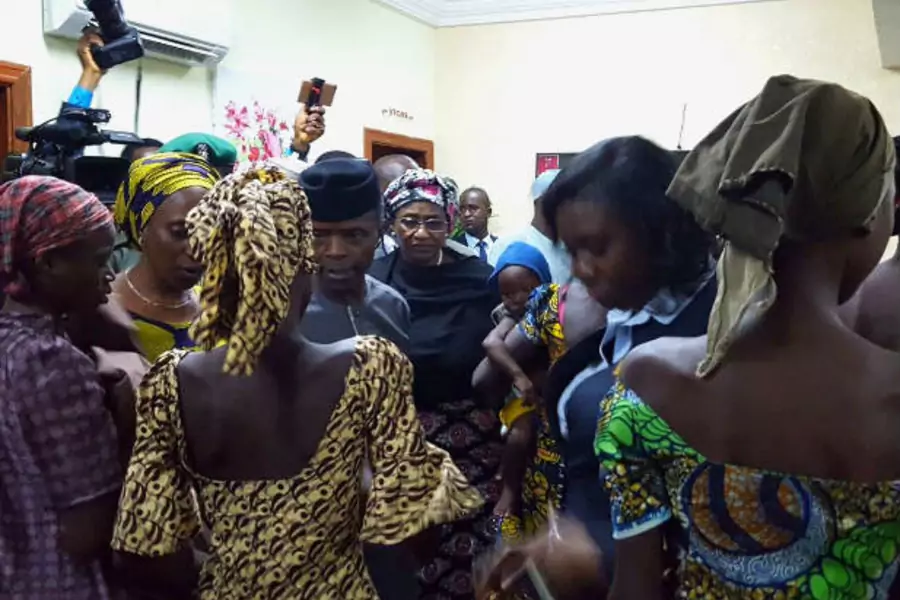Women Around the World: This Week

More on:
Welcome to “Women Around the World: This Week,” a series that highlights noteworthy news related to women and U.S. foreign policy. This week’s post, covering from October 8 to October 15, was compiled with support from Becky Allen. Anne Connell, and Lauren Hoffman.
Boko Haram releases twenty-one Chibok girls Twenty-one of the Chibok schoolgirls captured by Boko Haram militants in April 2014 were released this week in a deal brokered by the International Red Cross and Swiss government. Sources with direct knowledge of the deal suggest that the girls were freed in a swap for detained Boko Haram fighters. Nigeria’s Information Minister Lai Mohammed has evaded confirmation of these reports and the terms of the negotiation have not been released. In public statements, Mohammed insisted that the release of this small group of girls “is the first step in what we believe will be the release of all the girls.” Among the girls released, several reportedly now have children of their own as a result of the systematic rape and enslavement perpetrated by Boko Haram militants. And while many in Nigeria and around the world celebrate the release of the twenty-one girls this week, the majority of the nearly three hundred girls aged sixteen to eighteen who were kidnapped from their boarding school in 2014 remain missing. Since the high-profile abduction, approximately two thousand additional girls and boys have been forcibly taken by Boko Haram and thousands of Nigerians have been terrorized by rapes, beheadings, village burnings, and lootings.
Pakistan strengthens laws on violence against women After hours of heated floor debate, Pakistan’s parliament passed new legislation last week to toughen penalties for acts of violence against women, including so-called honor killings, thereby closing an important loophole in prior law. Previously, male relatives who committed honor killings could seek pardons from jail terms with the forgiveness of victims’ families, a provision that frequently resulted in impunity for perpetrators who hailed from the same extended families as their victims. Under the new law, victims’ families will only be able to spare a perpetrator from capital punishment. The new law also requires verdicts in rape cases to be issued within three months and sets mandatory minimum sentences of twenty-five years for perpetrators. The crime of honor killing—which killed approximately 1,100 women in Pakistan last year—has gained significant attention since the release of filmmaker Sharmeen Obaid Chinoy’s Academy Award-winning documentary on the subject, as well as this year’s widely-publicized murder of Pakistani celebrity Qandeel Baloch. Prime Minister Nawaz Sharif has since faced significant pressure to toughen laws on violence against women, and hailed the newly passed legislation as a landmark step.
New research finds gender gap in household work A UNICEF report released to mark the UN-recognized International Day of the Girl Child on October 11 suggests that the world’s girls spend 40 percent more time on household chores than boys do. The report describes the societal effect of this gender gap, which is correlated with lower rates of school attendance for girls, decreased economic output later in life, and risk of sexual violence during travel to collect water and firewood. The gap begins early in life, with young girls between the ages of five and nine spending an estimated 40 million more hours a day on household chores than boys, and girls aged ten to fourteen years old spending 120 million more hours each day. The burden for girls is greatest in South Asia and in the Middle East and North Africa. UNICEF’s Chief of Data and Analytics Attila Hancioglu suggested that “[q]uantifying the challenges girls face is the first critical step toward meeting the Sustainable Development Goal on gender equality and breaking down barriers that confront the world’s 1.1 billion girls.” The report underscored the theme of this year’s International Day of the Girl Child, which highlighted the importance of quality sex-disaggregated data to accelerating progress toward all seventeen Sustainable Development Goals.
More on:
 Online Store
Online Store